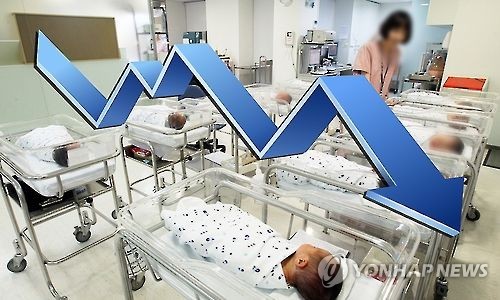Childbirths in South Korea dropped to a record low last year despite decade-long efforts to tackle the country's chronically low birthrate, a report showed Wednesday.
The number of babies born in 2016 reached 406,300, down 7.3 percent, or 32,100, from a year earlier, according to the report by Statistics Korea.
 |
(Yonhap) |
The figure marked the lowest number of newborns since 1970 when the statistics agency started to compile such data.
The crude birth rate, referring to the number of live births per 1,000 people, also came to an all-time low of 7.9, down from the previous year's 8.6.
Also, the total fertility rate, or the number of babies that a woman is projected to have during her lifetime, fell to 1.17 last year from 1.24, marking the second lowest figure following 1.076 recorded in 2005.
"Relatively, the number of women in their early 30s of the childbearing age band fell sharply last year from a year earlier.
And consequently, the number of their children decreased," said the office. "Due to the current low marriage rate, the birthrate is unlikely to make a rebound in the coming years."
The downbeat trend in the number of newborns has been regarded as one of the most worrisome social phenomena in South Korea, coupled with rapid aging.
The chronically low birthrate and aging population is feared to reduce the workforce and drive up welfare costs, undermining the growth potential of Asia's fourth-largest economy.
The South Korean government has poured 80 trillion won ($70.2 billion) into dealing with the low birthrate for the past decade, including measures to encourage people to have more children through offering various incentives like cash rewards.
Meanwhile, the number of deaths came to 281,000 last year, up 1.8 percent, or 5,100, from a year earlier, marking the largest annual death toll since 1983 when the statistics agency started to compile the data. (Yonhap)








![[Today’s K-pop] Blackpink’s Jennie, Lisa invited to Coachella as solo acts](http://res.heraldm.com/phpwas/restmb_idxmake.php?idx=644&simg=/content/image/2024/11/21/20241121050099_0.jpg)